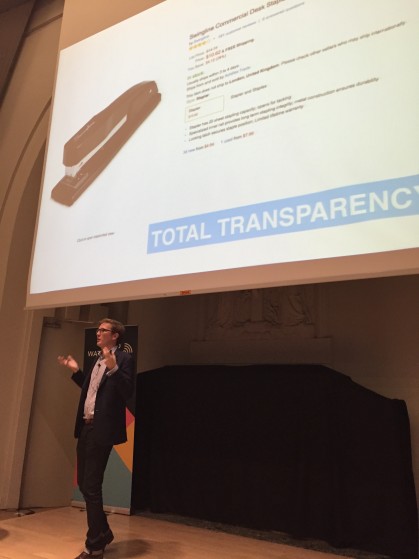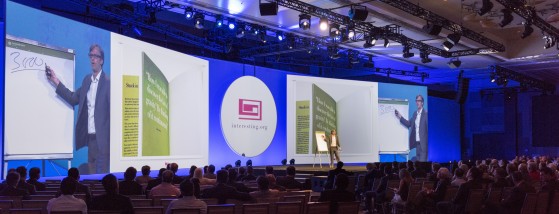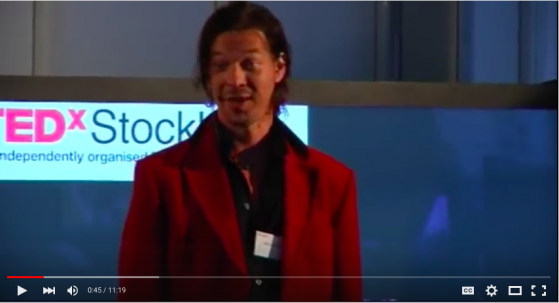
Today I had a revelation.
It happened as I was doing the Q&A after a speech I delivered at the Rotary Club of Singapore.
I had been invited to speak about the job of being a speaker and I it such an interesting topic that I gladly accepted their invitation. So for once, I did not talk about a topic that interests me. Instead, the topic was about myself. It was a bit weird – but fun – to give a talk about being a speaker.
Anyway, in the Q&A session after my speech, one of the many questions that I received was: “How do you decide which stories to tell?”
I replied: “The great thing with being a global keynote speaker is that people come up to you after your speech to share their stories and their favourite examples around the topic you just have been speaking on.”
I explained that the a great perk of my job is that just by being a speaker, you get access to so many interesting stories — stories that are often not well known.
The person who asked me the question had a follow-up question that really got me thinking. He said: “So your job is to filter out which stories to re-tell?”
Bang!
That’s when the revelation hit me. Or perhaps, I should say it in its plural form — “revelations”.
Revelation Number 1:
Our job as speakers is not to collect stories to tell, but to select among the stories we have heard that which are good enough to be included in our speech.
This means that we need to gather more stories than we are planning to tell.
I do not have an exact number, but I would guess that it should be something like “100/10/1”.
If we collect 100 stories, then 10 are good enough to be included in a speech, which means they are good enough to be written down and saved. And out of those 10 stories, we actually include 1 in our speeches.
So in essence, our job is not to “collect stories” but to “discard stories” until we have just a few great ones left. Those great stories are the ones we tell our audience.
Which brings us to Revelation Number 2:
As speakers, we are actually not “storytellers”. We are “story re-tellers”.
We do not just tell stories, but we re-tell stories that other people have come to share with us either by approaching us after a speech, agreeing to do an interview with us for our research, or by contacting us online, and so on.
Of course, this does not apply to the category of speakers whose speeches are built around their own life story like “climbing Mount Everest”, or “living without arms”, or “sharing my experiences as a Fortune 500 CEO”, etc.
For the rest of us who speak on a general topic, I would say that nothing beats the stories that you receive from audience members after you have given your speech.
Knockout Reasons Why Audience’s Stories Are Topnotch:
1) They are very genuine stories
Stories shared by people from the audience are close to their hearts because it is something about them or a close friend of theirs.
2) They are powerful
When a person decides to approach you after your speech, it’s because they really want to share the wisdom of the story to more people.
3) They are often unknown
Most likely, an audience member who shares a story with you is not a celebrity who has exposure in mainstream media or the internet. Thus, their story which you will tell (or more aptly, “re-tell”) will sound fresh when you share them on stage.
4) They are relevant
Since the person telling the story just heard your main message, my experience is that the stories you get right after a speech very often compliment the message that you have been trying to get across.
5) They make you think
Because the story is shared with you by a person who just heard you speak, you get a fresh perspective of your message that is from the point of view of another person. It usually helps to see your own topic with new eyes.
And that is just what happened today.
The man in the audience who asked me about “re-telling” stories helped me look at my own process of collecting, selecting and picking stories to tell in a new way.
So today’s post is very meta: I am writing a post about the value of collecting stories to re-tell from the audience, by telling you how I got to look at the process of re-telling stories by listening to a man in the audience who just heard me speak today. 😉
Lesson: Do not think that your job is just to “tell stories”. Instead, your job is to “re-tell” the stories that you come across as a speaker.
A bonus effect of thinking like this is that the speech becomes less about “you and your ideas” and more about “you as a person who is interested in the topic you are speaking on.”
Or to think in a metaphor, you are less of the “source of the river” and more of “the watering hole” where people who like your subject “go to drink”. I hope you understand what I mean. Less “YOU”. More “US”.
(Suggestion: Submit your email address in the form to the right to get a convenient email summary in your inbox every time 10 new posts have been posted.)


